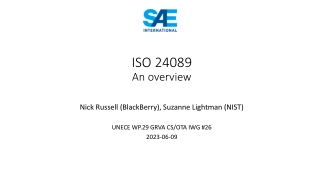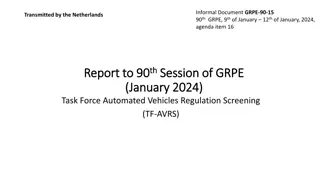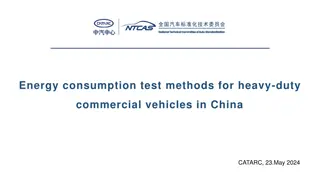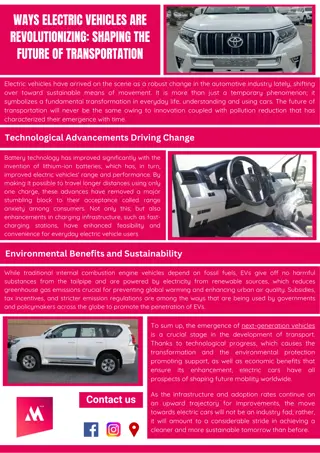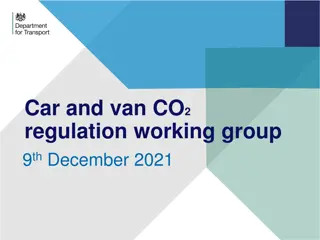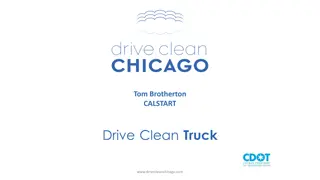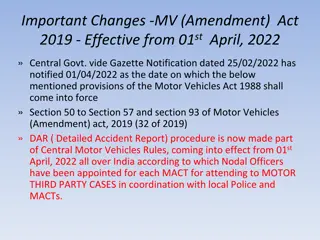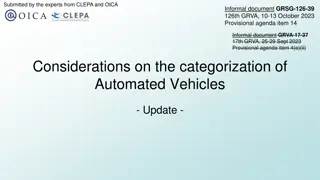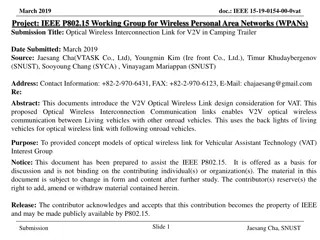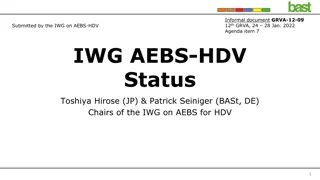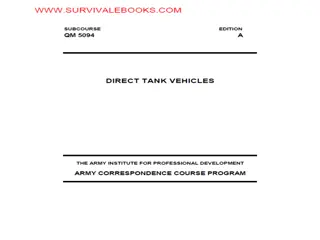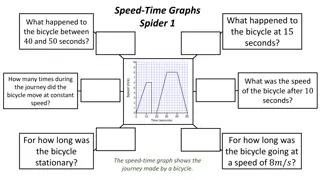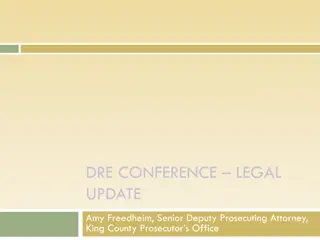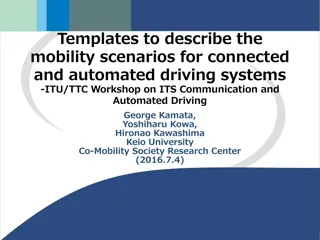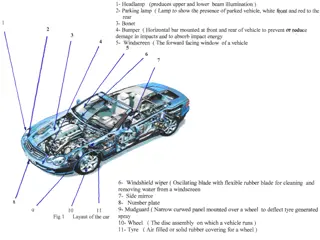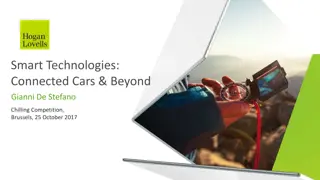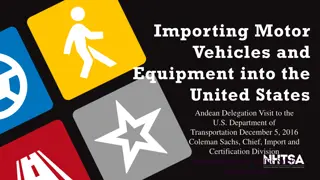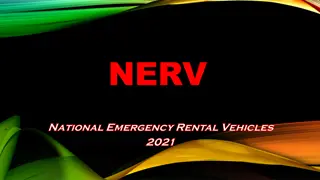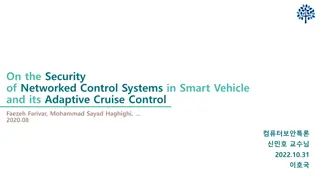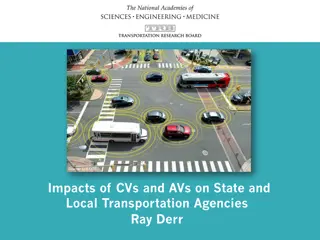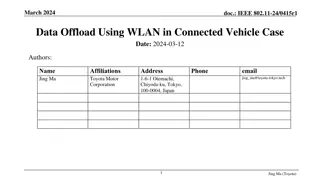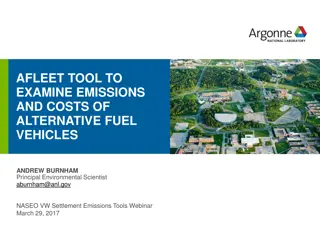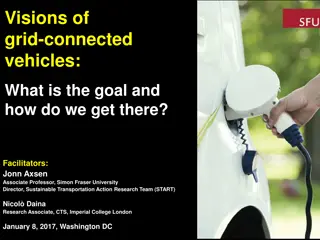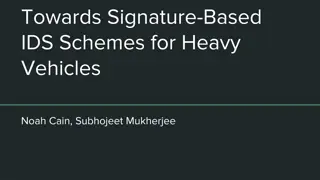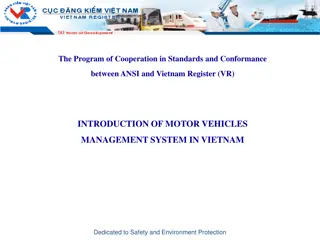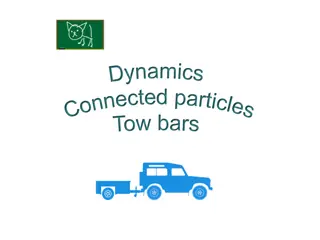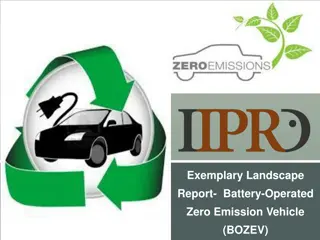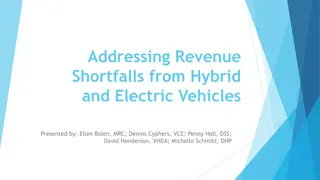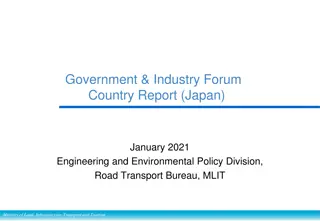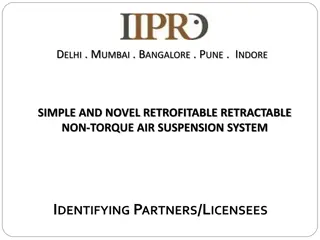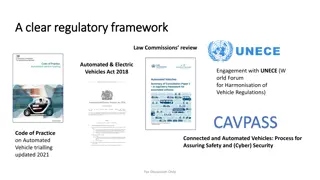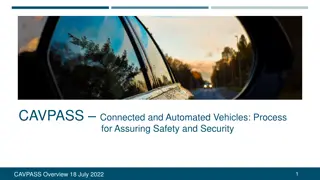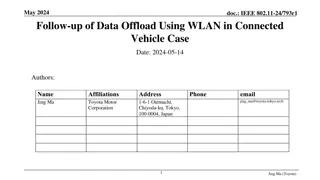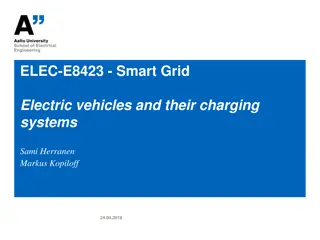Overview of ISO 24089: Software Update Processes in Vehicles
This overview delves into the ISO 24089 standard, focusing on the engineering processes related to software updates in vehicles. It covers the background, scope, coverage, and key terminology, highlighting the importance of safe and secure software updates in modern vehicles.
4 views • 14 slides
Career-Connected High School Grant Program Overview
The U.S. Department of Education's Career-Connected High School Grant Program aims to expand access to career-connected high school programs for students. With a project period of up to 36 months, the program impacts over 10,000 Wisconsin students through initiatives such as career advising, dual en
0 views • 11 slides
Electric Vehicle Informal Working Group Progress Report
The report provides an update on the Electric Vehicles and the Environment Informal Working Group's recent meetings, current work on hybrid power determination and in-vehicle battery durability, and developments in GTR-21 and GTR-22. The group is focusing on refining test procedures, considering CAN
2 views • 13 slides
Sustainability Benefits and Transition to LED Technology in Vehicles
Explore the sustainability benefits of LED technology in vehicles, focusing on improvements in energy efficiency and CO2 savings. The transition from halogen to LED technology is projected with significant potential for reducing carbon emissions. The acceleration of this transition through LED repla
3 views • 5 slides
Task Force Automated Vehicles Regulation Screening Report
The Task Force Automated Vehicles Regulation Screening (TF-AVRS) conducted multiple meetings and screenings to evaluate regulations and terms related to automated vehicles. The report outlines the screening process, considered items, results, and future plans for regulation screening in the automoti
0 views • 9 slides
green hydrogen market
green hydrogen is used as fuel to provide a sustainable mobility alternative. Fuel cells make vehicles more efficient and quieter; using green hydrogen allows vehicles to travel longer distances with less refueling. The increase in demand for green hydrogen is also due to growing government initiati
1 views • 3 slides
Energy Consumption Test Methods for Heavy-Duty Commercial Vehicles in China
China has released energy consumption testing methods for various types of fuel vehicles, including traditional fuel vehicles, hybrid electric vehicles, battery electric vehicles, fuel cell vehicles, natural gas vehicles, and methanol vehicles. The standards cover test methods for fuel consumption a
4 views • 15 slides
Shaping The Future Of Next-Generation Vehicles
Introducing our next-generation vehicles, the pinnacle of automotive innovation. These cutting-edge vehicles are at the forefront of technological advancement and are designed to be highly efficient, environmentally friendly, and technologically adva
2 views • 1 slides
Overview of Car and Van CO2 Regulation Working Group Meeting, 9th December 2021
The Car and Van CO2 Regulation Working Group convened on 9th December 2021 to discuss recent and upcoming legislative changes impacting CO2 emission regulations for vehicles. The meeting included agenda items such as collecting on-board fuel consumption monitoring data, manufacturer requirements for
0 views • 28 slides
Drive Clean Truck Incentive Program Details
Drive Clean Truck initiative in Chicago offers point-of-sale incentives to move fleets towards zero and low-emission vehicles, focusing on Class 2 to Class 8 trucks and buses. The program, funded by the Chicago Department of Transportation and administered by CALSTART, issued $11.3M for 288 trucks a
0 views • 9 slides
Important Changes in Motor Vehicles Act 1988 and Motor Vehicles Amendment Act 2019
Central Government has announced amendments to the Motor Vehicles Act 1988 and Motor Vehicles Amendment Act 2019 effective from April 1, 2022. The changes include the implementation of Detailed Accident Report procedures, appointment of Nodal Officers for motor third party cases, and definitions rel
1 views • 18 slides
Overview of Tanks and Armored Vehicles
Tanks, also known as panssarivaunut in Finnish, are armored military vehicles with tank treads. They come in various types such as telatykki, rynnäkköpanssarivaunu, and taistelupanssarivaunu. Additionally, the content delves into UK and USA tanks, including popular models like Matilda, Sherman, an
0 views • 11 slides
Update on Categorization of Automated Vehicles by OICA and CLEPA
OICA and CLEPA are updating the categorization of automated vehicles, introducing new subcategories and refining definitions for driverless and dual-mode vehicles. The work aligns with ongoing efforts in related groups and aims to enhance clarity in classifying different types of automated vehicles
0 views • 12 slides
Optical Wireless Interconnection Link for V2V in Camping Trailer
Introducing a design concept for Optical Wireless Communication Link for Vehicular Assistant Technology (VAT), enabling V2V communication between living vehicles and other on-road vehicles. Utilizing back lights of living vehicles, this system aims to improve visibility and safety on the road, espec
0 views • 5 slides
Update on Informal Working Group Activities for AEBS in Heavy-Duty Vehicles
The Informal Working Group on AEBS for Heavy-Duty Vehicles has made significant progress in developing a draft regulatory proposal to revise UN Regulation No. 131. Key tasks include assessing accident situations, exploring a generic marker triggering AEBS, defining performance requirements, and more
8 views • 9 slides
Proper Petroleum Marking and Inspection Guidelines for Vehicles and Equipment
As a petroleum supervisor, it is essential to inspect vehicles and equipment to ensure proper markings, preventing commingling of products and ensuring safety. This lesson covers the inspection of petroleum markings on tank vehicles, safety markings for bulk transportation, marking requirements for
0 views • 152 slides
Speed-Time Graphs Analysis - A Journey Through Various Vehicles
Explore the intriguing journeys of different vehicles through speed-time graphs. Witness the bicycle's sudden stop, the car's acceleration to reach 60 km/h, and the toy vehicle's varying accelerations and decelerations. Learn about constant speeds, maximum speeds, and durations of stationary and fas
0 views • 7 slides
Hailey's Law Update: Mandatory Impound for DUI Arrests
Mandatory Impound under Hailey's Law requires a twelve-hour hold on vehicles used by individuals arrested for DUI or physical control. Non-commercial or non-farm transport vehicles must be towed, and vehicles with arrested drivers as the registered owner cannot be redeemed for 12 hours. Commercial o
1 views • 18 slides
Templates for Mobility Scenarios in Connected & Automated Driving Systems
This report introduces templates for describing mobility scenarios in the context of connected and automated driving systems. It explores the importance of mobility, communication systems for vehicles, and examples of traffic management in mixed conditions, emphasizing the role of ICT. The visuals a
1 views • 28 slides
Importance of Clutches in Vehicles and Machinery
Clutches play a crucial role in devices with rotating shafts, allowing smooth engagement and disengagement between the engine and transmission. In vehicles, clutches enable gear changes and decouple the engine from the wheels during stops, ensuring efficient power transfer. Understanding how clutche
0 views • 27 slides
Smart Technologies and Connected Cars: Shifting Alliances in the Automotive Industry
Explore the dynamic landscape of connected cars and smart technologies, revealing a web of shifting alliances among key players in the automotive sector. From software and hardware manufacturers to public transport operators, the industry is witnessing strategic partnerships and collaborations that
0 views • 7 slides
Importing Motor Vehicles: Regulations and Procedures in the United States
The National Highway Traffic Safety Administration (NHTSA) plays a crucial role in setting federal motor vehicle safety standards (FMVSS) in the United States. Importing motor vehicles and equipment requires compliance with these standards and certification by manufacturers. Statutory prohibitions a
1 views • 33 slides
National Emergency Rental Vehicles Program Overview
The National Emergency Rental Vehicles (NERV) Program provides rental vehicles for personnel from various agencies responding to incidents that require specific vehicle types. This program is managed by NWCG agencies and is not available to contracted resources. Vehicles range from economy cars to h
0 views • 18 slides
Security Analysis of Networked Control Systems in Smart Vehicles
This paper explores the security challenges faced by networked control systems in smart vehicles, focusing on adaptive cruise control technology. It discusses the vulnerabilities in cyber-physical systems, such as intrusion detection systems, and highlights the potential risks posed by cyber attacks
0 views • 21 slides
Impacts and Research on Automated Vehicles in Transportation Agencies
This comprehensive content discusses the impacts of connected and automated vehicles (CAVs) on state and local transportation agencies, highlighting research initiatives such as the National Cooperative Highway Research Program (NCHRP). Various tasks and panels are outlined, addressing policy action
0 views • 24 slides
Data Offload Using WLAN in Connected Vehicles
The document discusses the need for data offloading from cellular networks to WLAN in connected vehicles to address overwhelmed cellular capacity and reduce costs. It highlights the challenges and gaps in current standards like IEEE 802.11u, emphasizing the importance of Wi-Fi infrastructure for con
0 views • 10 slides
Data Offload Using WLAN in Connected Vehicles
The market for connected vehicles is rapidly growing, leading to increased data consumption. This document highlights the importance of offloading data from cellular networks to WLAN in connected vehicles. Current solutions like 802.11u are insufficient, necessitating new standards to address the ch
0 views • 10 slides
AFLEET Tool for Examining Emissions and Costs of Alternative Fuel Vehicles
AFLEET is a tool developed by Argonne National Laboratory to analyze the emissions and costs of alternative fuel vehicles. It provides insights into the benefits of using different fuel technologies and helps in decision-making for vehicle fleet management. The tool includes calculations for emissio
0 views • 25 slides
Workshop on Vision of Grid-Connected Vehicles and Vehicle-Grid Integration
This workshop, led by Jonn Axsen and Nicol Daina, explores the visions and strategies for grid-connected vehicles and vehicle-grid integration. It delves into the benefits, risks, societal implications, and policy requirements of various VGI visions. Experts discuss consumer perceptions, business pr
0 views • 24 slides
Signature-Based IDS Schemes for Heavy Vehicles
This research focuses on developing signature-based Intrusion Detection System (IDS) schemes for heavy vehicles, particularly targeting the Controller Area Network (CAN) bus. The study delves into various attack vectors and payloads that have targeted commercial vehicles over the years, proposing th
0 views • 18 slides
Introduction of Motor Vehicles Management System in Vietnam
The Program of Cooperation in Standards and Conformance between ANSI and Vietnam Register (VR) focuses on introducing the motor vehicles management system in Vietnam dedicated to safety and environmental protection. It covers VR's main functions and fields, the law structure related to motor vehicle
0 views • 17 slides
Understanding Dynamics of Connected Particles in Physics
Delve into the world of connected particles in physics with a focus on tow bars, forces, and Newton's laws. Explore problems involving connected particles moving in the same direction and analyze scenarios like towing cars along a road. Gain insights into tension, accelerations, resistances, and for
0 views • 14 slides
Advancements in Battery-Operated Zero Emission Vehicles (BOZEV)
The report delves into the landscape of Battery-Operated Zero Emission Vehicles (BOZEV), highlighting their eco-friendly nature, cost-effectiveness, and reduced maintenance. It compares BOZEVs with fuel-propelled vehicles, emphasizing the benefits including zero emissions, low noise pollution, and s
0 views • 41 slides
Addressing Revenue Shortfalls from Hybrid and Electric Vehicles in Virginia
Gasoline tax revenues in Virginia fund road construction and maintenance, but the increase in electric and hybrid vehicles poses a challenge to this revenue source. The Commonwealth needs to incentivize electric and hybrid vehicles while maintaining funds for infrastructure. Recommendations include
0 views • 14 slides
Government & Industry Forum Country Report: Japan Safety and Environmental Measures for Motor Vehicles
This report from the Government & Industry Forum in Japan highlights safety and environmental measures for motor vehicles. It covers topics such as traffic accidents, government targets, vehicle safety promotion, automated driving, emission control, and international harmonization of regulations. Th
0 views • 15 slides
Innovative Air Suspension System for Vehicles
Introducing a novel retrofitable air suspension system for vehicles, offering enhanced mobility, stability, and cost-effectiveness. Addressing existing concerns with air suspension systems and multi-axle vehicles, the proposed technology features optimized hanger brackets, pneumatically operated mec
0 views • 15 slides
Regulatory Framework for Connected and Automated Vehicles in the UK
The UK has established a clear regulatory framework for Connected and Automated Vehicles (CAVs) to ensure safety and cyber resilience on roads. This framework includes new legal entities, authorizations, monitoring processes, and safety assurance phases. Key outputs from Law Commission reviews highl
0 views • 4 slides
Ensuring Safety and Security for Connected and Automated Vehicles - CAVPASS Overview
CAVPASS aims to develop safety and security processes for connected and automated vehicles (CAVs) in the UK by 2025. The program focuses on assuring the safety and cyber resilience of CAVs throughout their lifecycle, identifying critical elements in design, deployment, and use. It involves multiple
0 views • 14 slides
Enhancing Data Offload Using WLAN for Connected Vehicles
Discussing the importance of data offload using WLAN in connected vehicles, highlighting the gap between current IEEE standards and the requirements for efficient data transfer. Emphasizing the need for fast association, seamless handover, and optimized algorithms for connected vehicle cases, with e
0 views • 11 slides
Smart Grid Electric Vehicles Charging Systems in Finland
Finland aims to reduce traffic emissions by 50% by 2030, with plans for a significant increase in Electric Vehicles (EVs) and charging infrastructure. The country targets 250,000 EVs by 2030, supported by 1.5 million car heating poles that can double as EV chargers. Various charging modes, control u
0 views • 9 slides
